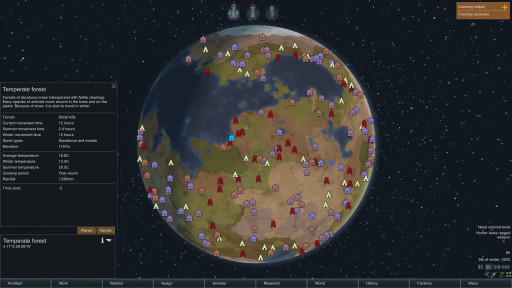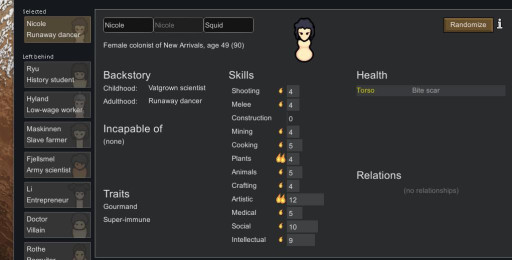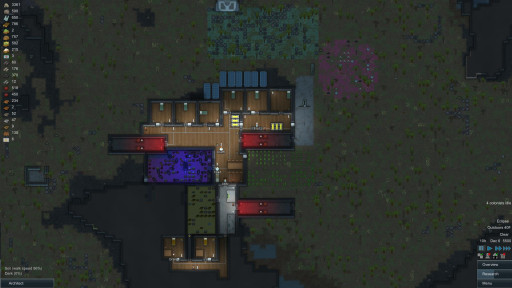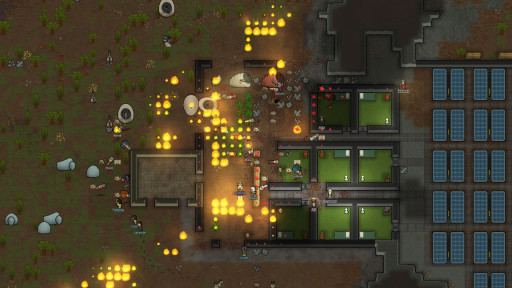
A lot of things can go wrong in Rimworld. Get Smart with these Rimworld Tips.
Surviving on the rim is hard. There are many things out there that will wipe your colony if given the chance. But, if you’re paying attention, it is viable to reduce risks and greatly increase the survivability and viability of your population. Making everything sustainable can be challenge though, after all, the game is designed in such a way to make drama happen at every turn.
So here we’ll look at some tips that can help you get started, in case your colonies are failing a little too much.
Choosing your starting site:

Planet generation screen.
- First thing you gotta do is choose where to land on your planet. If you click on a hex on the map, you can find some information about them. The two most important aspects are the temperature and the growing seasons.
- It helps to have some natural barriers to stop raiders at the beginning. To take advantage of that, Large Hills have a balance between having those barriers and keeping your base out of the mountains.
- Rivers are a plus, since you can use them both for defense and power generation.
- Don’t settle too close to other colonies. Whether they’re friendly or not, being too close will cause your relationship with them to constantly deteriorate. Lower relationships means less trading and more attacks.
Choosing your colonists:

Colonist generation screen.
- When choosing colonists, you should try to get a balanced team. Although the game allows you to randomize them, they have a point system to balance their pros and cons. Therefore you will hardly ever have a perfect colonist.
- Always check the health tab before choosing. You don’t want a colonist with a high shooting skill and cataract or a crafter missing a hand. Scars can also be a problem, because they will give your character an almost permanent mood debuff.
- The most important skills for starting are, in this order: Growing, Shooting, Construction, Crafting, Mining and Intellectual. Cooking and Medicine are also important, but there are ways to get around these.
- Avoid colonists who are unable to do certain jobs. People who don’t haul or don’t care for the injured are bound to give you a headache.
- Always check the traits. See if they are good or bad and worth your time. Sometimes bad traits can be managed, but sometimes that’s a little harder. Pyromaniacs, for example, will set fire to your base from time to time. So unless you’re having a barbecue, you should probably avoid them.
- Colonists with lower skills but very good traits are better for the long run, but will make things harder at the beginning.
Getting more people:
- It might seem at first that you want as many people as you can, but it might be better to reject people sometimes. Don’t be afraid to do that. More people means you’ll need more food and resources, and if they don’t pull their weight that could be a problem.
- When raiders are downed and not killed, you can capture them for recruitment purposes. Always pause the game and check if they’re worth your time before doing it. An unwanted prisoner might not be worth your time and resources. Leaving a raider to die has no implication on the mood of the colony, but letting a prisoner die does.
- If you really want to capture a raider and make sure you won’t kill them, use blunt weapons, like clubs, maces, fists or even melee attacking with guns.
- Unless you really need extra hands, people who are being chased and call you asking for asylum might not be a great plan. They give you a bit of information about themselves, but you won’t know details about their skills and traits. So it’s sometimes not a gamble worth taking.
- People will drop from pods sometimes. They will be hurt and need medical attention. Again, check their stats and see if they’re worth your time. If they belong to a different faction, they’ll likely not join you, so if you really want them it’s better to capture instead of rescuing. However this will make your relationship with that faction go down. If you rescue someone from another faction and let them go after they’re healed, your relationship with that faction will get a boost.
Base-building:

A little thriving Colony.
- Starting the game using structures made of wood is a good plan. They’re cheap, easy to come by and fast to place. Just remember to replace them later, since they’re very flammable and not very strong against attackers.
- A lot of resources like food, components and clothing will deteriorate when left outside. If you have some storage space inside, prioritize the perishables. Resources like steel, gold and stone will not deteriorate outside.
- A quick and cheap structure to store materials and food can be made with a 9x9 roof and a wooden or steel wall in the middle. It’ll only take 5 resources to build since roofs don’t cost anything and it’ll be a good enough starter storage. You can add a couple of walls on the corners to make it safer from roof collapse. Resources deteriorate from being unroofed and outside, so putting a roof over them removes at least one of these penalties. Remember to upgrade it once the colony gets going.
- Diversify your power production. It’s good to have different sources of power in case something happens to one of them. Night and eclipses will halt your solar panel production and wind turbines are not constant. Watermills and Geothermal generators are more reliable but they need to be place in specific locations and might break.
- Avoid batteries if you can help it. They’re a great way of keeping you from having power issues, but if they’re overcharged they might cause a short circuit explosion. You might need them eventually though, so try to install switches to avoid overcharging.
- In very cold biomes you can use geysers to heat up your colony. They are a constant source of heat, even during solar flares, and can be the difference between surviving and dying in the early-game.
- Run your conduits through the walls so they don’t hurt the aesthetic of the rooms.
- Carving a base out of a mountain is viable and gives you security from raids, but it takes a long time and will make you open to the possibility of insect infestations and these are quite difficult to deal with.
- Diversify your defenses. Sometimes enemies will try to get around them or maybe the circumstances will keep them from working. Use traps, lay down different kinds of turrets, and build cover for your colonists.
- Giving individual rooms to your colonists is a must, since it gives them a mood buff. Don’t make them too small though. 4x4 rooms are good enough if you’re short on space, but if you make them a 6x6 good-looking room, the bonus will be even better.
- Nutrient Paste Dispensers are great ways of making the best out of your food. Colonists don’t really like it, and it will give them a mood penalty, but they make your food use more efficient, will never cause food poisoning and won’t take your colonists’ time for cooking. They require power, so it might be a good idea to have some nutrient paste meals stored in your freezer in case a solar flare happens.
- Be careful with hoarding resources. Everything you add to your base, like structures, crops, stored resources and people will increase the wealth of your colony. With increased wealth, come harder and stronger raids.
Colony management:
- Assigning work priorities is essential. You should always set firefight, patient and bed rest to 1. The other priorities need to be done based on your needs and your colonists’ skills. This might be a bit boring at first, but it reduces the need to micromanage everything later.
- Try to keep a good amount of components on hand, even if you need to buy them from traders. Electronic devices will break once in a while and need components replaced. If you don’t have any and an essential piece of equipment stops working, you’ll be in trouble.
- Also try to keep a good amount of stone bricks for building. Having some extra in hand might really make a difference when building quick defenses or repairing broken walls.
- If you don’t want to think about your crops too much, go with potatoes. They’re balanced in production and time taken to be harvested. If you can grow crops all year long though and are not in a rush to get food, corn is the one to go with. Rice is good for when you need food quickly, since it grows really fast, but the amount produced is quite low.
- Pay attention to the map temperature at all times. If your crops are not fully grown, colonists will not harvest them automatically, but you can still give them the order to do so if you think the plants will die because of the temperature.
- Always keep a stock of extra clothes in case you need it. Clothes worn by colonists deteriorate over time and will give them a mood debuff when they’re below 50% quality. In the beginning, go with whatever fabric or leather you can get your hands on, but as you progress, try to make clothes better suited for your situation.
- Remember to check your colonists’ moods so they’re not prone to having mental breaks. Try to satisfy their demands to the best of your abilities. You can keep recreational drugs around in case an unexpected event lowers their mood too much.
- Sometimes animals will self-tame. When that happens, check how useful that animal is and if your colony has enough food to keep them. Most are not worth the trouble and you’re better off using them for food.
- Animals can be used to ease the amount of work in your colony. They can be trained to haul resources to your stockpiles and although they won’t do it as soon as they can, they can really help colonies with lower population and abundant food. Just remember that as of 1.0, trained animals require maintenance, so too many might be more work than they’re worth.
Combat:

Mechanoid attack wiping a colony.
- If your enemies have ranged attacks, cover is your friend. It makes your colonists harder to hit, be them trees, walls or rocks. Of course walls are better covers usually. It also helps to take the cover away from enemies when you can, like chopping trees from possible battlegrounds or shooting them while they’re crossing a river.
- Checking your guns’ stats is a good way to see what they’re good for. This way you can know their range, damage and shooting speed.
- Against melee attackers, it’s a good plan to keep moving. Before doing that, compare their move speed with your colonists’ to make sure you can outrun them. If they’re faster than you, try to slow them down with some leg shots.
- Check your foes stats and try to take out their better trained and better equipped units first. Be careful with grenadiers and snipers specially.
- Dress your colonists to kill, I mean, survive! Good amour will greatly reduce and sometimes even negate damage. Give shield belts to your melee users so they don’t have to worry about being shot.
- In case a manhunter pack of animals bigger than you can handle comes to your colony, it’s possible to keep your colonists safe by placing them inside structures until the pack is gone or falls asleep. It’s a bit boring and eating/sleeping might be a problem depending on how your colony is built, but it’s better than losing all your progress because of 46 blood-thirsty chinchillas.
- When attacking enemy outposts, you can take out their turrets by shooting their power source or conduits from a range they can’t reach. This way you can also uninstall them and take them home with you after you’re done!
- If a colonist or raider you want to capture is very hurt and will die before you can take them to a hospital bed, you can quickly lay down a sleeping spot and set it for medical to give them first-aid before they bleed out. After that, just delete the spot and try to rescue them again so they’re taken to a proper bed.
- Mechanoids are difficult to fight against, but with well placed traps and colonists, you can take them down from a distance before they can do any real damage. Range and traps are the best choices, but you can also use EMP grenades and other guns to do the work. Remember to disassemble the mechanoids at a machining table for some extra goodies.
Dealing with Disaster:
- Beavers! They might not seem like a lot of trouble at first, but they will eat all the trees on the map fairly quickly. You should send at least two colonists to deal with them. By dealing with them, I mean shooting. They might turn manhunter and attack you colonists though, so be careful.
- A Blight will sometimes emerge on your crops, making the affected plants not produce any food. They will also spread if not taken care of, so you should have them removed as soon as possible.
- Cold Snaps and Heat Waves will make your region significantly colder or hotter respectively. It is usually a good idea to harvest your crops and turn the heater or cooler up. Also, try to keep the temperature in your freezer controlled so the food doesn’t spoil. If it’s too bad, use fires and passive coolers inside your base as temporary solutions.
- If a fire breaks out inside a structure, the first thing to do is open the doors to the outside, so the heat escapes. You don’t want your firefighters passing out inside a burning room due to a heat stroke.
- Always have some medicine stored in case a disease breaks out. They usually affect several colonists and prisoners and can be fatal. Have them take it slow if they get sick and try to keep them comfortable and treated.
- Prisoners will sometimes find a way to escape. For this reason, you shouldn’t keep weapons or clothing close to your prison, because they will go for them if given the chance. You can capture them again if you knock them out.
- Psychic drones will sometimes affect your colonists in both good and bad ways. Usually people from one specific gender will be affected by it and get a temporary mood boost or penalty. You can use drugs like beer to keep their mood higher during these events.
- Solar Flares will keep all your electrical devices from working. This includes temperature control, turrets and hydroponic basins. It doesn’t last long and it’s usually not a big deal, but it can really harm your colony if it happens during a raid or a cold snap. Also, harvest those crops from your hydroponics ASAP!
- Volcanic Winters will obscure the sun and make solar panels produce less power and plants grow much slower, sometimes not at all. It’s not a big deal if you’ve set up an inside food production and diversified your power generation as well. But this event is a real colony killer, since it might last for over a year. There’s not much to do about it besides being prepared in case it happens.
- Toxic Fallouts are another pain in the butt. They will make every unroofed living thing build-up toxicity until it dies. If the living things are your colonists they might actually develop dementia or a carcinoma. All you need to do is keep your colonists indoors and greatly reduce their time outside. Make sure your animals stay inside too. These can last a few days to two months, so similarly to Volcanic Winters, do your best to be prepared.
These will get you started quite nicely. Remember that the keys to surviving Rimworld are understanding the mechanics, anticipating problems and being prepared. These will take time and experience, so don’t worry too much if your colony doesn’t make it too far.
You can always correct your mistakes in a new one and make it even better.
You may also be interested in:
